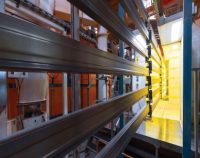| How to take Course | Preview course material Puchase to access Quixz |
|---|
Electrification-Power System Evolution and Infrastructure Development: 5 PDH
$30.00
SPECIFIC KNOWLEDGE OR SKILL OBTAINED
This course teaches the following specific knowledge and skills:
- Understand Electrification and what it means for the future
- Discuss end-use technology variations of the U.S. electrical system infrastructure
- Discuss variations on cost, energy consumption, and emissions
- Discuss demand-side flexibility variations
- Explain electric sector variations on system evolution, costs, energy consumption, and emissions
CERTIFICATE OF COMPLETION
You will be able to immediately print a certificate of completion after passing a 20 question multiple-choice quiz. The quiz can be retaken unlimited times until a passing grade of 70% or better is earned. This course satisfies five (5) hours of professional development (PDH).
Related Courses
Coating Types and Characteristics of Metals: 3 PDH
$18.00 Add to cartIn this course the student will understand the characteristics and applications of various industrial coatings and metal finishes. Instructor: Seth Grablow, PESPECIFIC KNOWLEDGE OR SKILL OBTAINED
This course teaches the following specific knowledge and skills:
- Discuss various metal coating types and characteristics
- Explain film-forming mechanisms and binders
- Understand driers, pigments, solvents, and miscellaneous additives
- Explain zinc-rich coatings and VOCs
- Understand powder coating, thermal sprays, galvanizing, etc.
CERTIFICATE OF COMPLETION
You will be able to immediately print a certificate of completion after passing a fifteen (15) question multiple-choice quiz. The quiz can be retaken unlimited times until a passing grade of 70% or better is earned. This course satisfies three (3) professional development hours (PDH) of continuing education.
Preview CourseClick “Preview Course” to View Prior to PurchaseClick “Add to Cart” to Purchase and Access QuizWastewater Treatment Plants: 1 PDH
$6.00 Add to cartPackage plants are pre-manufactured wastewater treatment facilities typically used to treat flows between 0.01 and 0.25 MGD. This course provides information about three types of package plants, extended aeration, sequencing batch reactor and oxidation ditch systems. General configuration, typical applications for each, advantages and disadvantages, typical performance, and cost are covered.Instructor: Raymond Bosek, PEPackage plants are pre-manufactured wastewater treatment facilities typically used to treat flows between 0.01 and 0.25 MGD. This course provides information about three types of package plants, extended aeration, sequencing batch reactor and oxidation ditch systems. General configuration, typical applications for each, advantages and disadvantages, typical performance, and cost are covered.
SPECIFIC KNOWLEDGE OR SKILL OBTAINED
This course teaches the following specific knowledge and skills:
- General configuration of extended aeration, sequencing batch reactor, and oxidation ditch package plants
- Typical applications for extended aeration, sequencing batch reactor, and oxidation ditch package plants
- Advantages and disadvantages of extended aeration, sequencing batch reactor, and oxidation ditch package plants
- Design criteria for extended aeration, sequencing batch reactor, and oxidation ditch package plants
- Typical performance and costs of extended aeration, sequencing batch reactor, and oxidation ditch package plants
CERTIFICATE OF COMPLETION
You will be able to immediately print a certificate of completion after passing a 10 question multiple-choice quiz. The quiz can be retaken unlimited times until a passing grade of 70% or better is earned. This course satisfies 1 professional development hours (PDH) of continuing education.
Preview CourseClick “Preview Course” to View Prior to PurchaseClick “Add to Cart” to Purchase and Access Quiz




